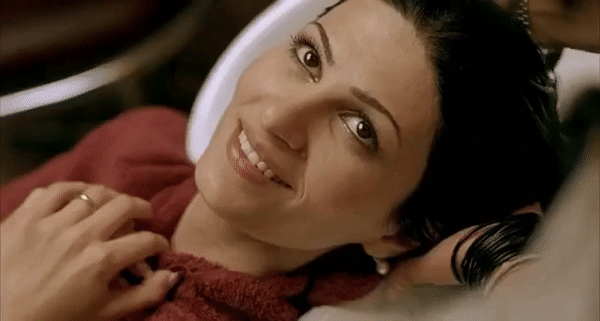Words by N.H.
Visuals from Film ‘Caramel‘, by Nadine Labaki, 2007.
This article is part of the “My Hair My Hair” issue
I met the love of my life when I was 18, but I didn’t know it at the time. It took me five whole years to admit it to myself, then to her. The first time we kissed was at her house. We started to undress, but for some odd reason, kept our headscarves on. I imagine we would have looked ridiculous to anyone who walked in on us making out on the living room couch, headscarves draped loosely on our heads. But that would have been the least of our concerns.
We made an intoxicating discovery early on in our relationship: in a country where homophobia and state/societal discourse are deeply-interwoven, nobody notices two women in love. We held hands, interlaced fingers, and kissed in every stairwell, bathroom, and building lobby imaginable. What we saw: two girls desperately in love, shoulders sagging under the weight of an inescapable sense of inevitable doom. What they saw: two close friends who faithfully observed the hijab with loose-fitting clothing and not a single hair in sight. Pious, well-brought up, behaved, “normal”— in other words, straight.
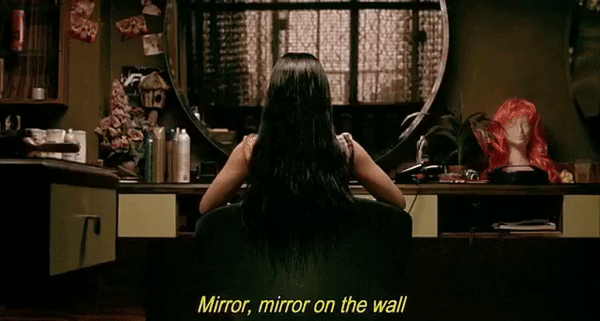
Clip from Film ‘Caramel‘, by Nadine Labaki, 2007.
I struggled to reconcile the image my hijab projected with the sinner I felt I was on the inside. Also, who was I supposed to cover in front of now? Boys and girls? Just boys? Just people I was sexually attracted to or could be sexually attracted to me? The Internet was largely unhelpful. Homosexuality was only discussed in one capacity: how severe the punishment should be. To the majority of Muslims, I was simultaneously sin, myth, and paradox. My soul grew increasingly heavy, and an insidious blend of shame and guilt tightened my headscarf around me like a noose.
I eventually stopped wearing it, something I had never thought would happen. The years before I took it off, I’d been experimenting with shorter and shorter hair. Whenever my hair grew long enough to roll into a bun, suffocation would slowly creep into my chest until I found myself at the salon, hairdresser confirming I was sure before setting her silver scissors to work.
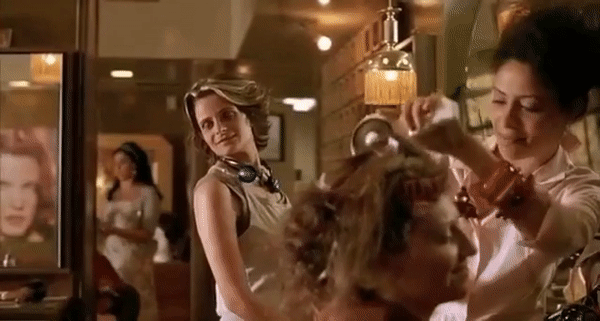
Clip from Film ‘Caramel‘, by Nadine Labaki, 2007.
I continued to wear it short after taking off the hijab. My favorite feeling in the world was stepping outside after a fresh haircut and running my fingers repeatedly across the nape of my neck. I was feather-light, weightless.
Confusing people in the street about my gender nearly always filled me with a delicious thrill. I liked the idea of being incomprehensible: neither visibly woman nor man, Muslim nor Christian. I liked the idea of simultaneously being nothing and everything.
But I also liked the idea that having shorter hair made my sexuality, almost by default, suspect. Queerness, especially in relation to my faith, was something I struggled with so deeply and painfully for some time, to the point that it felt like it didn’t belong to me. I wasn’t allowed to embrace it, celebrate it, find joy in it. My short curly hair felt like a celebration. A wonderful fucking of gender norms. An announcement that I loved women, especially one in particular. A reclamation of a part of me I tried so violently to repress. Ignore. Extinguish. Eradicate.
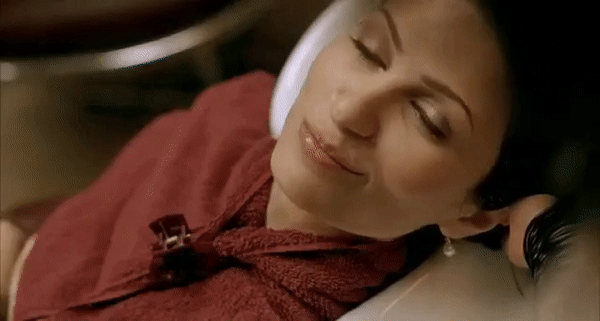
Clip from Film ‘Caramel‘, by Nadine Labaki, 2007
In 2017, I attended a concert, without a doubt the largest I’ve ever been to, and the line-up included one of my all-time favorite bands, Mashrou’ Leila. For the first time in my life, I felt visibly queer. I also didn’t feel safe. As my girlfriend and I weaved through the dense throng of bodies, trying to find our friends in the deafening crowds, I heard a group of boys mutter “lesbians.” We weren’t even among those who lifted pride flags into the air that day, but we might as well have had rainbows plastered on our foreheads. Unease snaked under my skin and settled in my stomach.
The aftermath of the concert was ugly. I started picking out larger earrings to wear and more feminine clothing. Being incomprehensible right now was a luxury I couldn’t afford. I started growing my hair out.
In the years that followed, I started befriending more queer women. In the safety of those unapologetically gay bubbles, I cut my hair shorter again, sported an undercut, added to my growing collection of piercings. I felt my queerness blossoming in ways it had previously been unable to flourish, and with it, I explored different ways of presenting my body to the world.
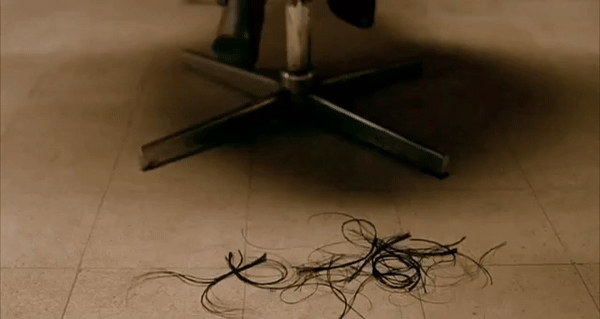
Clip from Film ‘Caramel‘, by Nadine Labaki, 2007
In 2020 and the year that followed, I suffered loss upon loss. They piled one after the other, burying me in one of the deepest and most debilitating depressions of my life. One of those losses was my relationship with the love of my life. Someone once told me that we’re only queer when we’re in a relationship. When we’re loving, fucking, kissing, singing poetry to other women. Can you be queer if not in relation to someone else?
My curly hair now falls to my shoulders. The failed undercut I attempted over the summer has grown several centimeters long. Soon it’ll be long enough to pin up with a collection of bobby pins. I no longer “look” queer. I look visibly feminine. Visibly woman. Yet, the way I define womanhood has never been broader: an ocean I’m perennially discovering new depths to. I am woman. I’ve also never felt more queer.
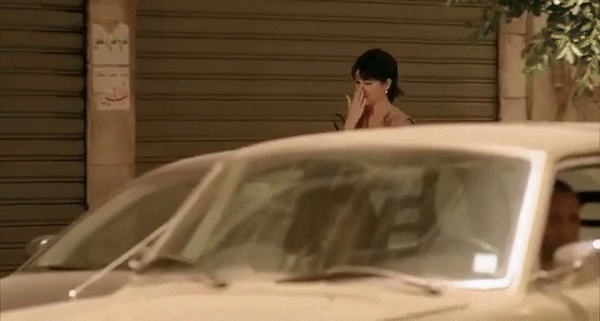
Clip from Film ‘Caramel‘, by Nadine Labaki, 2007
Sometimes, I wish I didn’t have to chain-swipe through precariously-secure dating apps to find a pair of lips to kiss. I wish to meet someone the old-fashioned way: in a musty aisle in a charming bookstore, amid dizzying lights and heady music at a concert, next to the fruit and vegetable section at the supermarket. But I live in Cairo, not a Western queer work of fiction. Now that my outside no longer matches the prevailing stereotype, there’s no way to signal my queerness to the beautiful girl standing across the street, waiting for the rush of cars to abate. I picture us crossing at the same time, locking gazes, smiling. I stand silently at the side of the road, at once visible, invisible, and everything in between.
I wonder how many of us queers feel the same way. How many of us worry simultaneously about looking too queer in a police state that abhors our existence and not looking queer enough to signal that we exist and yearn to love and be loved in all our messy complexity?

